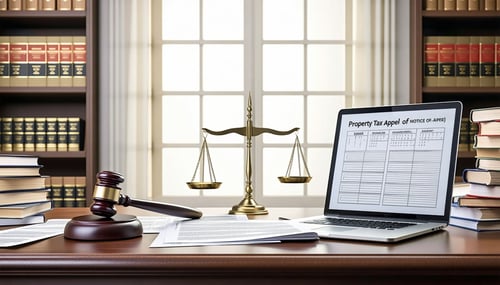If you've received an unfavorable decision from the Cobb County Board of Equalization (BOE) — or in limited cases, directly from the Board of Tax Assessors — your next legal option is to appeal to the Superior Court of Cobb County. This step transitions your dispute from an administrative process to a formal civil lawsuit governed by court procedures.

Here’s what you need to know about the Superior Court appeal process in Cobb County:
🧾 1. Your Right to Appeal
Both you, the property owner, and the Cobb County Board of Tax Assessors have the right to appeal a decision made by the BOE to the Cobb County Superior Court.
⏰ 2. The 30-Day Deadline
You have 30 calendar days from the date of the BOE’s written decision (typically the mailing date) to file a Notice of Appeal with the Board of Tax Assessors — not the court directly.
⛔ Missing this deadline will likely result in your case being dismissed.
📝 3. Filing the Notice of Appeal
Your written appeal must be submitted to the Cobb County Board of Tax Assessors. Include the following:
-
📍 Parcel Identification Number (PIN)
-
🏠 Property address
-
📄 Copy of the BOE decision
-
✍️ Brief explanation of why you disagree with the BOE’s ruling
The Board will then schedule a settlement conference within 30 days to try resolving the case without court.
💵 4. Required Property Tax Payment
Under O.C.G.A. § 48-5-29, Georgia law requires you to pay the full amount of taxes billed in the most recent year for which taxes were determined due before your Superior Court case can be heard.
🔔 Failure to pay this amount to the Cobb County Tax Commissioner can lead to dismissal of your appeal.
💳 5. Filing Fee
-
A $25.00 filing fee (payable to the Clerk of Superior Court) is required to initiate the civil case.
-
This fee is usually submitted along with your appeal to the Board of Assessors, who will forward it when certifying the case.
🔄 6. Certification of the Appeal
Once your appeal and payment are received:
-
The Board of Tax Assessors certifies the appeal by forwarding documentation from previous steps (BOA and BOE) to the Clerk of Superior Court.
-
The court will assign a civil action file number and notify you of the case status.
⚖️ 7. The Court Process
Once in court, your case becomes a civil lawsuit:
-
🧑⚖️ Formal procedures under the Georgia Rules of Civil Procedure apply.
-
🧑💼 Legal counsel is highly recommended, especially for complex cases.
-
🔍 You and the Board may enter discovery, including document requests, written questions, and depositions.
-
🤝 You may attempt settlement at any time before trial.
👨⚖️ 8. Trial & Outcome
If no settlement is reached:
-
The case will go to trial before a jury or judge, depending on the circumstances.
-
The jury determines the fair market value of your property.
-
The judge issues a final order based on the verdict.
✅ If successful, your assessed value and tax bill will be reduced.
💰 If overpaid, you're entitled to a refund. If underpaid, you may owe additional taxes.
📌 Important Notes
-
This process is more complex, time-consuming, and expensive than administrative appeals.
-
Expect legal fees, possible expert witness costs, and extended timelines.
✅ Final Tip:
Taking your case to Superior Court is a serious legal undertaking. Consult with a Georgia property tax attorney or consultant if you want to ensure your appeal is properly prepared and presented.
📚 Resources – Cobb County Property Tax Appeal (Superior Court)
-
🏢 Cobb County Board of Tax Assessors – Appeals Info
https://cobbassessor.org/appeals/ -
🧑⚖️ Cobb County Superior Court Clerk – Tax Appeal Process PDF
https://www.cobbsuperiorcourtclerk.com/wp-content/uploads/2021/10/Tax-Appeal-Process.pdf -
💼 Cobb County Tax Commissioner – Tax Info
https://www.cobbtax.org/property -
⚖️ Georgia Code – O.C.G.A. § 48-5-29
https://law.justia.com/codes/georgia/2020/title-48/chapter-5/article-5/part-2/section-48-5-29/



